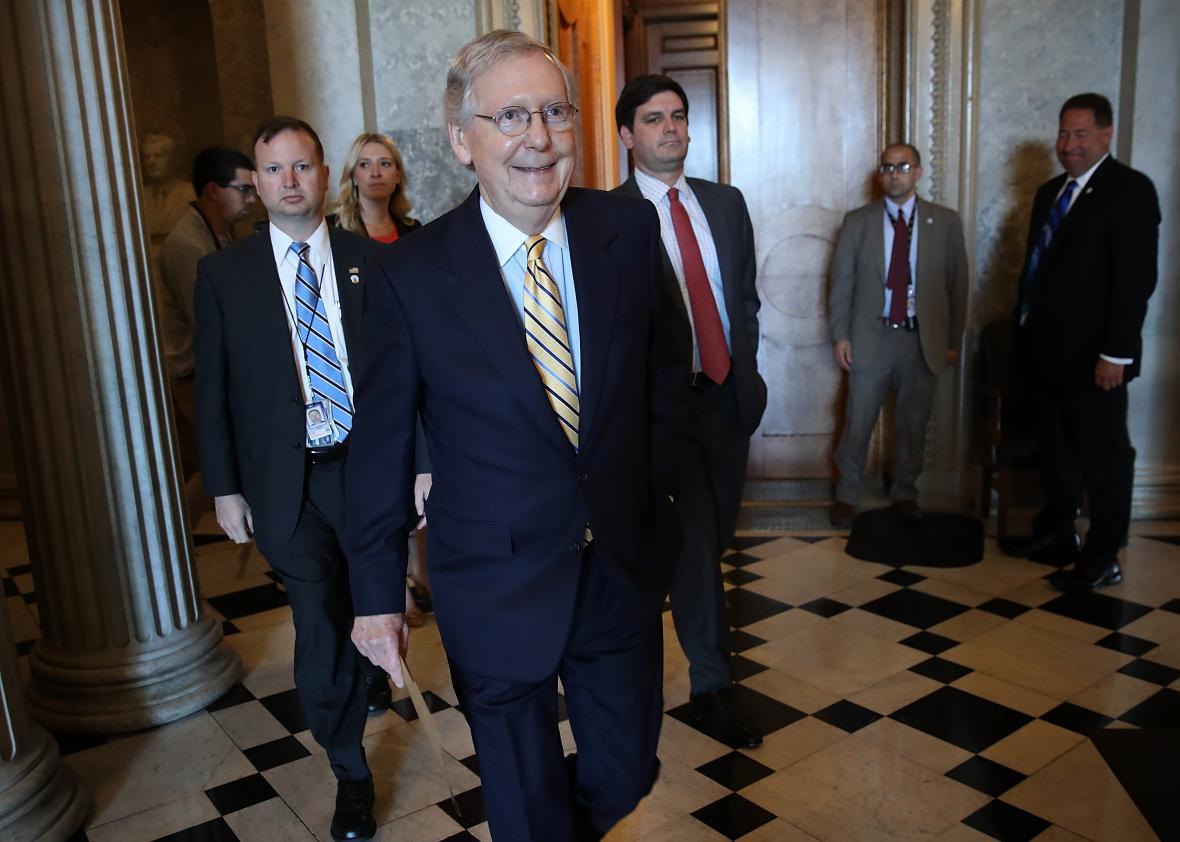
Getty Images
With just hours to go before they are expected to start voting on health care despite there being no actual legislation in sight, desperate Senate Republicans are reportedly considering a last-resort, stripped-down bill that would end Obamacare’s individual mandate, along with some of its taxes, while leaving the rest of the law untouched.
Here is how the four-step “skinny repeal” plan would work, as outlined by NBC’s Leigh Ann Caldwell:
1) First, Mitch McConnell would have to wrangle 50 votes on the motion to proceed. That isn’t guaranteed. But the conventional wisdom right now says Republicans will play along, basically as a courtesy to Sen. John McCain, who is hauling himself to Washington from Arizona despite his brain cancer diagnosis. (Update, 4 p.m.: The motion to proceed has passed! Afterward, McCain gave a long, rousing speech about how the Senate should return to normal order, even though he had just cast a vote allowing it to continue ignoring those very procedures.)
2) Republicans would vote on a bill to repeal Obamacare without immediately replacing it. This will almost certainly fail but will provide a great emotional release for Sen. Rand Paul.
3) The party would then vote on the Better Care Reconciliation Act, its full repeal-and-replace plan, complete with the controversial Cruz amendment, which lets insurers sell unregulated insurance policies as long as they also offer Obamacare-compliant plans. Because that provision hasn’t been scored by the Congressional Budget Office, however, it can’t pass through the reconciliation process and will need 60 votes to overcome a filibuster. In other words, it’s also dead on arrival.
4) Finally, they’ll trot out the “skinny repeal,” which would kill the individual mandate requiring Americans to buy health insurance, the rules requiring large employers to offer their workers coverage, and the medical device tax. These are basically the only pieces of health care reform that count as consensus among Senate Republicans.
As a piece of health care policy, the “skinny repeal” bill is a travesty. To repeat what health care writers have written at least a gazillion times now, repealing the individual mandate while leaving the rest of Obamacare unchanged would likely push the individual insurance markets into a death spiral, as young and healthy Americans stopped buying insurance, leaving behind a customer pool full of older patients with extensive medical costs. This is not even really a hypothetical. Prior to 2010, states tried and failed to impose Obamacare-esque rules forcing insurers to cover the sick without requiring everyone to buy coverage. The result: dysfunctional markets and sky-high premiums. Obamacare minus the mandate might be a little less of a train wreck, because it at least offers people subsidies to buy insurance that cap premiums as a percentage of their income. But it wouldn’t be a good scene. The CBO, for its part, thinks the BCRA would leave millions more Americans uninsured by 2018 because it eliminates the mandate.
Republicans know this. That is why they have tried to come up with alternatives to the mandate. The latest public version of the Senate bill, for instance, included a rule saying Americans who let their coverage lapse for too long would have to wait at least six months before buying a new health plan. (The Senate parliamentarian recently ruled that piece would violate reconciliation rules, meaning it would also need 60 votes to pass.)
But the skinny bill does not appear to be a real policy compromise. Instead, it seems like a legislative tactic aimed at keeping Obamacare repeal alive by winning 50 votes, then kicking the legislation over to a conference committee, where Republicans in the House and Senate can hash out a final piece of legislation. Of course, if this truncated, nonsensical bill is the only thing upper-chamber Republicans can pass now, it’s unclear why anybody thinks they’d be able to strike a workable bargain with the more conservative House—other than the possibility that lawmakers will feel they’re too deep in at that point to turn back.
By now, the Republican health care push looks like the slapstick end of a football game, where the losing offense starts blindly tossing laterals in the hope that they’ll get lucky and make it to the end zone. It’s ugly and silly. But there’s always a slim chance it could work.